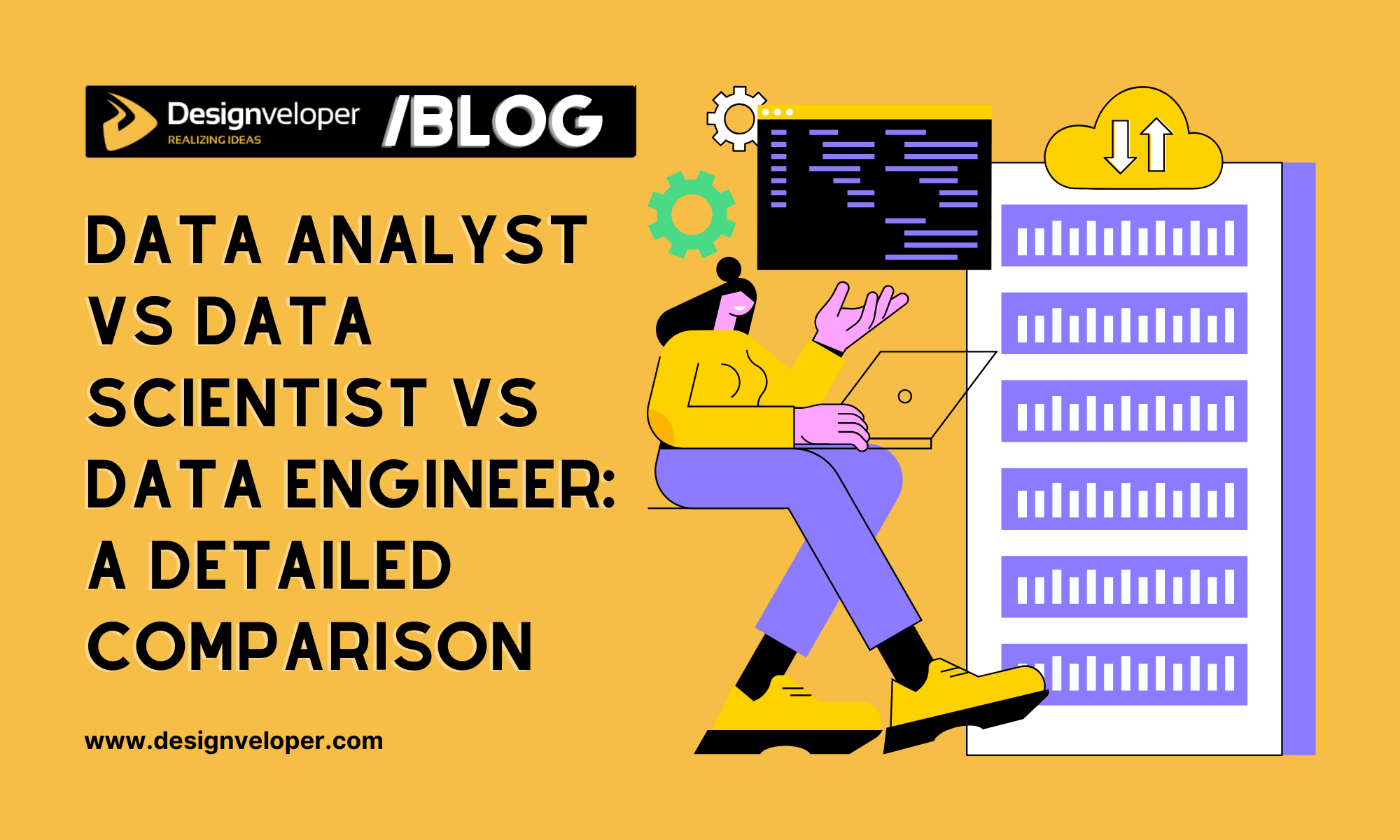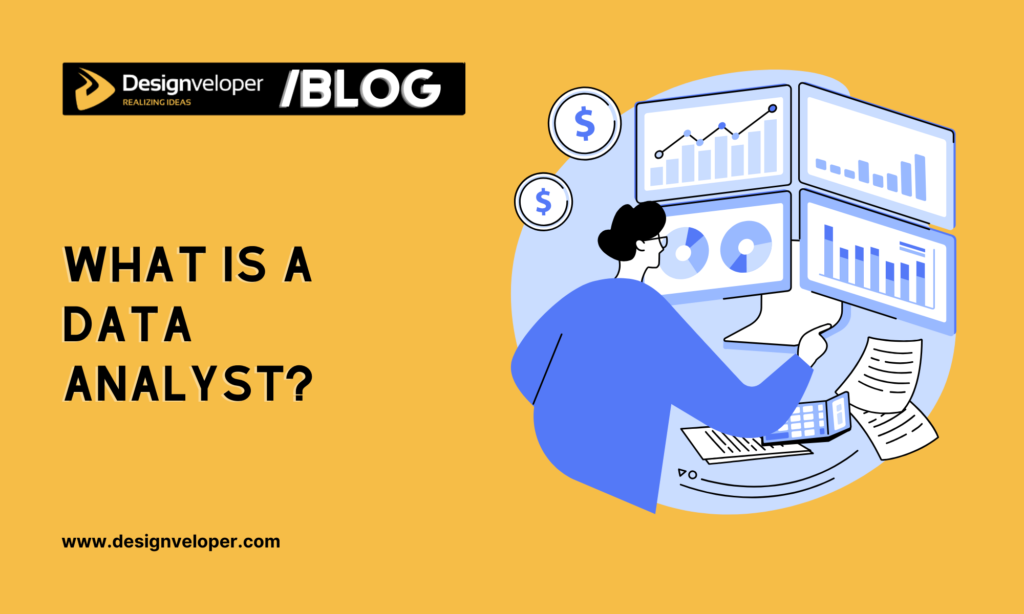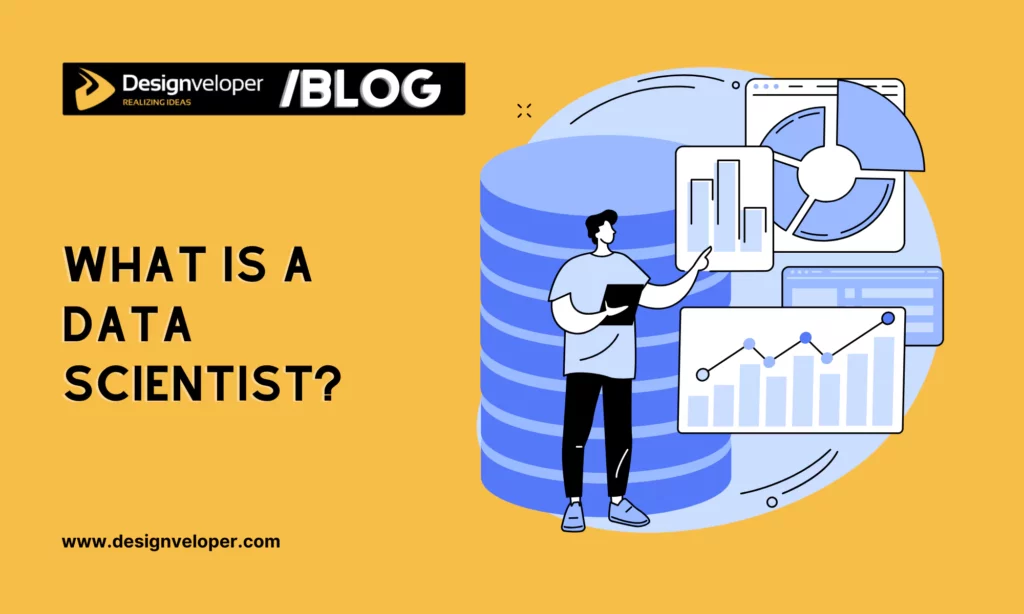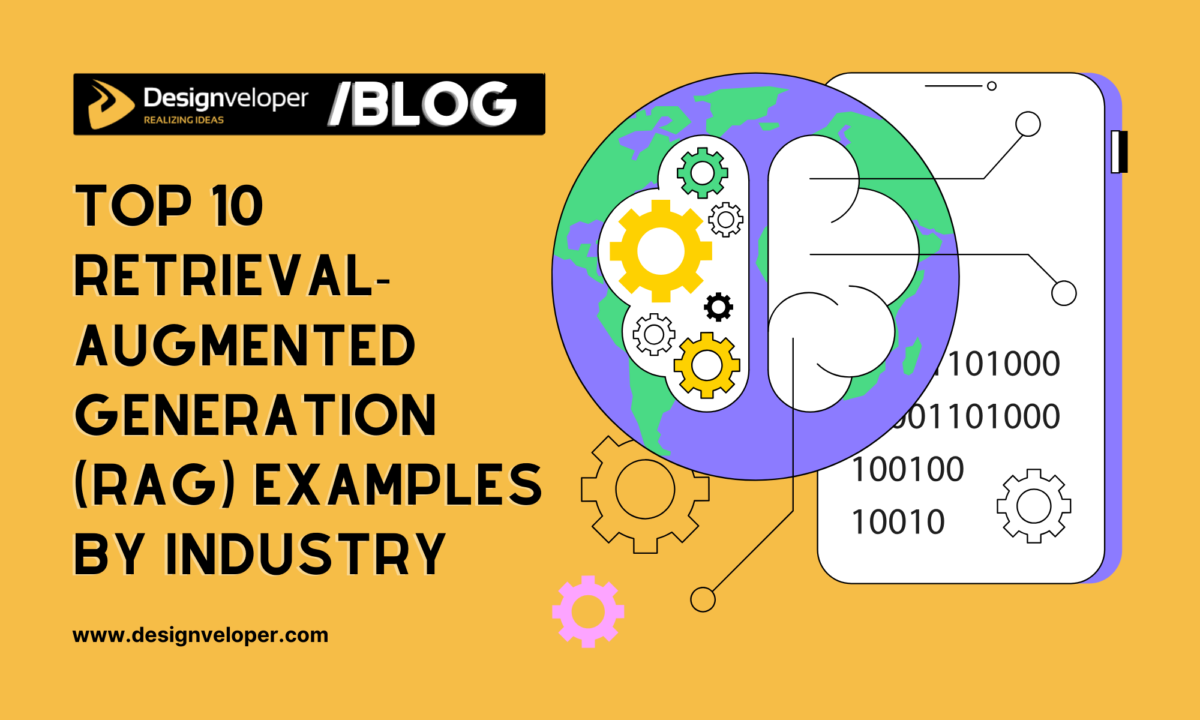Data Analyst vs Data Scientist vs Data Engineer: A Detailed Comparison
January 15, 2025


With the explosion of data, there came the relevant job positions, usually data analysts, data scientists, and data engineers. These roles are in the field of data, but do very different things. If you’re new to the world of data or if you hope to switch careers, this article is where you can read about all three of these jobs from beginning to end. Continue to read and find out the key differences between a data analyst vs data scientist vs data engineer!
What is a Data Analyst?

A data analyst is a specialist who gathers, processes, and analyzes data. Typically, they need to collaborate with relevant stakeholders to translate specific needs and figure out what data is needed to respond to these requests. In doing so, they must examine historical data for patterns, and gather actionable insights from that data which will be conveyed to the stakeholders in visual forms (e.g., graphs or charts).
Key Roles
- Data Collection: Data analysts gather relevant data from multiple sources (spreadsheets, databases, and external datasets) to resolve a certain task.
- Cleaning: They clean data by handling incomplete, inaccurate, and inconsistent values.
- Analysis: They use various analytical methods (e.g., descriptive analysis or content analysis) as well as statistical tools (e.g., Power BI) to identify repeating patterns, trends, and correlations in the data.
- Data Visualization: They create visual reports and interactive dashboards to showcase insights and findings from the data.
- Data Visualization: They present meaningful insights and findings from data by creating visual reports and interactive dashboards.
- Decision Support: By communicating data, they offer evidence-based recommendations to help enhance overall decision-making and business operations.
Recommended reading: 10 Best Data Analytics Tools and Techniques in 2025
Key Skills
- Proficiency in Analytical Techniques and Tools: Data analysts need to be adept at necessary techniques and tools (like Excel or Tableau) to perform data analytics effectively.
- Statistical Knowledge: They need a solid understanding of statistics (e.g., different types of data, variability, or measures of central tendency) to analyze and explain data precisely.
- Understanding of Programming Languages: They need to know programming languages like Python or SQL. These languages help automate repetitive tasks (e.g., writing scripts to retrieve data from different sources) and perform advanced analysis.
- Critical Thinking: They need to explain data critically and offer meaningful insights.
- Communication: They need to communicate insights and complex findings clearly so that non-technical stakeholders can understand and make informed decisions.
Salary
The salary of a data analyst varies depending on his/her years of experience, working locations, and more. But data analysts in the United States often receive an average annual income of $80,898 with a cash bonus of $2,000. Further, Energy, Mining & Utilities and Financial Services are two top-paying industries for this position, with a median total pay of $111,000.
FURTHER READING: |
1. Define-XML Driven Solutions: Optimizing Clinical Study Outcomes |
2. Data Driven Decision Making: A 7-Step Guide |
3. What is Data Analytics? Types, Steps & Tools for Beginners |
What is a Data Scientist?

A data scientist is a professional who employs advanced analytics, statistical methods, and machine learning to extract patterns from structured and unstructured data. Not only are they not limited to obtaining actionable insights into what matters now. But they also leverage past data to build and train ML models that predict future demands or automate decision-making.
For example, suppose you have an eCommerce store, and you hire a data scientist to build a recommendation engine that suggests products to the customers on your website based on what they have purchased before.
Key Roles
- Data Exploration: Like data analysts, data scientists clean and process large datasets. They then combine statistical analysis and machine learning algorithms (e.g., decision trees, clustering, or neural networks) to spot patterns and insights from data.
- Model Development: They develop predictive models and algorithms to handle specific data tasks. For example, data scientists at Boston Children’s Hospital created DRAMMS group-wise registration algorithms to combine all brain scans of different patients into a single atlas for medical imaging purposes. These models and algorithms help automate decision-making processes and enhance accuracy.
- Data Communication: They interpret and communicate findings from models to improve business strategies.
Recommended reading: 10 Real-World Case Studies of Implementing AI in Healthcare
Key Skills
- Programming Languages: Data scientists need to be proficient in programming languages, typically Python, SQL, and R.
- Big Data Technologies: They need to be familiar with using big data technologies (e.g., Spark, Hadoop, NoSQL databases like MongoDB, and cloud platforms like AWS). These tools help them process even exabytes of data to conduct sophisticated analyses and create complex models.
- Machine Learning: They need deep expertise in machine learning techniques (e.g., Scikit-learn or TensorFlow) and advanced mathematics. Such knowledge helps them build reliable algorithms and models.
- Data Mining, Conditioning & Optimization: Data mining helps scientists uncover hidden relationships or trends in vast datasets. Conditioning refers to cleaning and converting data for analysis. Meanwhile, optimization involves using techniques like data compression or partitioning to optimize data processing tasks. These skills are essential to harness necessary data for demand forecasting, fraud detection, and other complex tasks.
- API Development: Building APIs to help data scientists connect their models smoothly with other software systems.
- Critical Thinking & Problem-Solving: Data scientists need these soft skills to tackle business issues using data-driven methods.
Salary
With an average annual salary of $123,141 in the US, data scientists have higher earnings than data analysts. Today, the highest-paying industries for this position are Financial Services and Information Technology, with a total annual pay of $148,000. However, other factors like experience and geographical location can affect your total pay.
What is a Data Engineer?

A data engineer is mainly in charge of developing programs that collect data reliably and effectively for usage and analysis. Such programs often include architecture and data pipelines. The architecture is often about databases or large-scale processing systems that can support vast datasets. Meanwhile, data pipelines are automated processes of delivering data from different sources to destinations for analysis.
Key Roles
- Data Pipeline Construction: Data engineers build, schedule, and monitor data pipelines to ensure they operate efficiently. In other words, engineers must use tools like Apache Airflow, AWS Step Functions, or Luigi to help data be processed in the accurate order and flow smoothly across systems without errors.
- Architecture Maintenance: They develop data architecture, or platforms, that include specific technologies like databases (e.g., MySQL, PostgreSQL), cloud storage services (e.g., AWS S3), or big data processing frameworks (e.g., Apache Spark). They need to regularly monitor, maintain, and troubleshoot the architecture to help data scientists and analysts do their jobs effectively.
- Data Warehouse Management: They apply techniques (e.g., query optimization or indexing) to ensure the optimal performance of data warehouses, data lakes, or data marts. In other words, they need to ensure that data warehouses can process large data volumes effectively and user queries run quickly without delays.
- Data Integration, Generation & Management: Data engineers are responsible for designing custom solutions to integrate data from various sources. Plus, they often generate real-time or even synthetic data for testing and analysis purposes. Moreover, they’re in charge of creating guidelines for everyone in an organization to store, access, and use data securely.
Key Skills
- Data Manipulation: Data engineers should have the skills to manipulate structured and unstructured data. Specifically, they must handle different data types and formats and integrate such data smoothly into data warehouses. In addition, they need to design data systems for other users to store and access such data securely.
- Experience with Tools: They should know how to use databases (MySQL), data warehouses (Google BigQuery or Amazon Redshift), and data frameworks (Hadoop or Apache Spark). Further, they must be good at using testing frameworks and CI/CD tools.
- Programming and Algorithms: They need to be skilled in languages like Python, Java, or Scala to write scripts or applications that handle massive datasets effectively. They also need to develop algorithms for tasks like data sorting and implement strong data pipelines to process data at scale.
- SQL: Data engineers need deep expertise in SQL to build and monitor ETL (Extract, Transform, Load) pipelines. Also, this language helps them manipulate data effectively and optimize database performance.
- Problem-Solving and Creative Thinking: Data engineers need these soft skills to address complex problems effectively.
Salary
Among the three positions, the annual income of data engineers is highest with $125,345 in the United States. Naturally, the figures also differ based on factors such as an engineer’s experience or geographical location. Further, Arts, Entertainment & Recreation is the top paying industry for this position, with a medium total pay of $147,000.
Data Analyst vs Data Scientist vs Data Engineer: A Comparison Table
To help you better envision the differences between data analysts, data scientists, and data engineers, we created the following comparison table:
| Factor | Data Analyst | Data Scientist | Data Engineer |
| Definition | Analyze historical data to derive meaningful insights. | Use statistical techniques, advanced analytics, and machine learning to extract insights and predict future outcomes. | Develop and manage data architecture and pipelines. |
| Core Responsibilities | – Query databases- Analyze data and visualize findings | – Perform complex statistical analysis- Develop machine learning algorithms- Build predictive models | – Create data architecture and ETL pipelines- Ensure data integrity and flow |
| Key Skills | – Statistical analysis- Analysis and visualization tools (e.g., Excel, Tableau, or Power BI) | – Proficiency in statistics and machine learning- Expertise in such programming languages as Python or R | – Proficiency in data architecture and pipeline design- Understanding of cloud platforms (e.g., AWS or Azure)- Expertise in SQL, Python, and big data technologies (e.g., Hadoop or Spark) |
| Data Focus | Structured data | Structured and unstructured data | Structured and unstructured data |
| Output | Reports, summaries, and dashboards | Algorithms and predictive models | Data pipelines, data warehouses, and data lakes |
| Business or Technical Driven? | Require main focus on business skills to explain data for insights | Combine business knowledge and advanced technical skills | Mainly focus on technical skills to develop strong data infrastructure |
| Collaboration | Work closely with relevant stakeholders to resolve data needs | Cooperate with data engineers and relevant stakeholders to craft predictive models | Collaborate with data analysts and scientists to maintain data reliability and accessibility |
| Average Salary | $80,898 | $123,141 | $125,345 |
Which Job Should You Choose?

Data has been booming in recent years, resulting in the significant growth of data-related jobs. According to the US Bureau of Labor Statistics, the job openings for data scientists are predicted to increase by 36% from 2023 to 2033. This translates to roughly 20,800 openings annually over the given period.
For those looking for jobs associated with data, this is a truly good sign. However, among the three jobs we mentioned, which one should you choose? Data analysts, data scientists, or data engineers? This depends on many factors:
- Interests: Are you more interested in working closely with business teams or addressing technical challenges?
- Background: If you have no technical background or fundamental knowledge about data, starting as a data analyst is often the most accessible option. It’s because this position requires less technical expertise and a shorter learning curve than data scientists and engineers.
- Career Aspirations: Where do you want yourself to stand in the future? Do you prefer developing the backbone of data infrastructure, devising data-driven strategies, or building predictive models?
Only when you understand the main differences and requirements of each job, can you make a wise decision that fits your strengths and career goals.
Job Opening: Be Our Colleague!
Through this article, we expect you to have a better understanding of how a data analyst, data scientist, and data engineer differ. The choice for your future job depends greatly on your interests, background, and even career ambitions.
You already have two or more years of practical experience working with big data infrastructure and are looking for a data engineering position. Why don’t you join us? We at Designveloper are opening a lucrative position for our Lumin team. Lumin is a document editor that allows users to edit, send, and sign PDFs easily and effectively. Since its first launch, Lumin has boasted more than a million users globally.
If you want to become a part of our Lumin team, drop us your CV or portfolio! Read more about our data engineering position here!






Read more topics
You may also like




























































